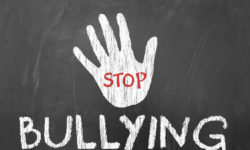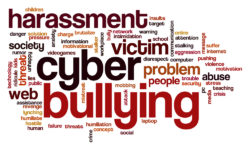Helping Bullied Kids and Teens
Unless you’ve directly experienced bullying, you may not realise just how devastating it can be, especially to a child or teenager. As well as being deeply hurtful, bullying can leave anyone feeling frightened, angry, depressed, and totally undermined. But bullying should never be tolerated. Whether you’re the one being bullied, or you’re a teacher or parent who thinks their child is being bullied or engaged in bullying behaviour, there are steps you can take to deal with the problem.
Need help with online or cyber-bullying?
If a bully is harassing, threatening, or humiliating you or someone you love by using computers, cell phones, or social networking sites, read Cyberbullying. The most damaging aspect of bullying is its repetition. Bullies are often relentless, bullying over and over again for long periods of time. You may live in constant fear of where and when the bully will strike next, what they’ll do, and how far they’ll go.
What is bullying?
Bullying is when an individual or group uses its power and strength to repeatedly, deliberately and intentionally use words or actions against another or a group that hurts, harasses, humiliates verbally, physically, psychologically or electronically making the victim feel oppressed, traumatised and powerless.
Bullying is repeated aggressive behaviour that can be:
Common acts of cyber bullying include:
- Cyber-stalking
- Denigration
- Exclusion
- Flaming
- Harassment
- Impersonation
- Outing and Trickery
- Pornography
- Sexting
Common acts of emotional bullying include:
- Alienating and deliberately leaving an individual out of activities
- Encouraging others to reject or exclude the individual
- Creating unkind rumours and/or gossip and the spreading of such rumours
- Repeated ignoring of the other who wishes to establish communication or dialogue
- Exclusion from a group and or social activity/activities
- Inappropriate stares and intimidating looks
- Imitation and impersonation in order to degrade an individual, or group which the individual might belong to i.e. because of their race, religion, sporting, or interest group
Verbal homophobic abuse can be a number of practices including:
- Teasing, name calling, spreading of rumours associated with a persons gender or sexuality, suggestive remarks, and social isolation through verbal means e. g “No you cannot join in because you are gay”.
Homophobic bullying can include physical violence, threats, damage to personal belongings, social exclusion and cyber bullying.
- Stealing, hiding, or ruining someone's things
- Hazing, harassment, humiliation. Making someone do things he or she doesn't want to do.
- Pushing, kicking, hitting, damage to belongings, locking the victim in a confined area, group intimidation (ganging-up) and intimidating the victim to commit involuntary actions.
Physical bullies seek to establish superiority and continuous control over their victim.
Racial bullying is encountered regularly in Australia and experienced by individuals from all races and cultures and may include incidents of:
- Physical, verbal and emotional bullying
- Targeted comments that are insulting and degrading in nature such as name-calling, gestures, taunts, insults and jokes based on racial difference
- Offensive vandalism, such as offensive graffiti and comments placed around physical settings
- Patronising and making fun of customs, music, accents, dress, clothing attire and physical appearances
- The refusal to work, co-operate or amicably engage with others because of their race, culture, or religious belongings.
- Refusing to talk to someone
- Excluding someone from groups or activities
- Spreading lies or rumours about someone
- Hazing, harassment, humiliation. Making someone do things he or she doesn't want to do.
Verbal Bullying is the use of words to taunt, threaten, insult, embarrass, put down, swear at, mock or intimidate the victim alone or in front of others.
Verbal bullying is said to be the most common form of bullying in Australia.
Verbal remarks, jokes, sarcasm, teasing and discriminatory name calling could be considered as funny and part of the social dynamic for bullies, but in reality, such remarks can make people feel shy, self-conscious, hopeless and lead to insecurity.
Our work with bullies and bully victims indicate that verbal content, i.e. what the bully says; is usually what the bully is feeling. The bully is thus, attracted to the victim because they may think the victim is powerless, weak, helpless and non-assertive.
| Results of Bullying |
|---|
Boys frequently bully using physical threats and actions, while girls are more likely to engage in verbal or relationship bullying. The results are similar:
|
What bullying is not…
- A single act of telling a joke that has no intention to make the other feel hurt or embarrassed
- Apologising for behaviour immediately
- Bad mood or disagreement with someone’s point of view
- Bumping into someone unintentionally
- Expressions of unpleasant feelings regarding others
- Non-verbal behaviours such as being excluded, not playing with someone, choosing different people or groups to play with
- One off incidents that have not repeated
- Statement of dislike towards someone
Why a bully might be targeting you?

Research shows that about 25 percent of kids experience bullying, so you’re not alone. While there are many reasons why bullies may be targeting you, the main reasons are usually your physical appearance or social standing within your peer group.
Bullies tend to pick on people who are “different” or don’t fit in with the mainstream. It may be because of how you dress, act, or because of your race, religion, or sexual orientation. It may simply be that you’re new to the school or neighbourhood and haven’t made friends yet.
Who do bullies target?
- Gay or lesbian individuals (homophobic bullying)
- Individuals from a different religious background, ethnicity or race
- Individuals that have noticeable physical differences, disability or impairment
- Individuals they perceive as weak and less powerful
- New students/employees, alone or not in a group
- Overweight or skinny individuals
- Shy and passive individuals
- Those that perform poorly
| If you are being bullied, remember: |
|---|
|
Tips for dealing with a bully and overcoming bullying
There is no single solution to bullying or best way to handle a bully. It may take some experimenting with a variety of different responses to find the strategy that works best for your situation. To defeat a bully, you need to retain your self-control and preserve your sense of self.
- Walk away from the bully. Bullies want to know they have control over your emotions so don’t react with anger or retaliate with physical force. If you walk away, ignore them, or calmly and assertively tell them you’re not interested in what they have to say, you’re demonstrating that they don’t have control over you.
- Protect yourself. If you can’t walk away and are being physically hurt, protect yourself so you can get away. Your safety is the first priority.
- Report the bullying to a trusted adult. If you don’t report threats and assaults, a bully will often become more and more aggressive. In many cases adults can find ways to help with the problem without letting the bully know it was you who reported them.
- Repeat as necessary. Like the bully, you may have to be relentless. Report each and every bullying incident until it stops. There is no reason for you to ever put up with bullying.
By changing your attitude towards bullying you can help regain a sense of control.
- Try to view bullying from a different perspective. The bully is an unhappy, frustrated person who wants to have control over your feelings so that you feel as badly as they do. Don’t give them the satisfaction.
- Look at the big picture. Bullying can be extremely painful, but try asking yourself how important it will seem to you in the long run. Will it matter in a year? Is it worth getting so upset over? If the answer is no, focus your time and energy elsewhere.
- Focus on the positive. Reflect on all the things you appreciate in your life, including your own positive qualities and gifts. Make a list and refer to it whenever you feel down.
- Find the humour. If you’re relaxed enough to recognise the absurdity of a bullying situation, and to comment on it with humour, you’ll likely no longer be an interesting target for a bully.
- Don’t try to control the uncontrollable. Many things in life are beyond our control—including the behaviour of other people. Rather than stressing, focus on the things you can control such as the way you choose to react to bullies.
Having trusted people you can turn to for encouragement and support will boost your resilience when being bullied. Reach out to connect with family and real friends (those who don’t participate in bullying) or explore ways of making new friends. There are plenty of people who will love and appreciate you for who you are.
- Find others who share your same values and interests. You may be able to make friends at a youth group, book club, or religious organisation. Learn a new sport, join a team, or take up a new hobby such as chess, art, or music.
- Share your feelings. Talk to a parent, counsellor, coach, religious leader, or trusted friend. Expressing what you’re going through can make a huge difference to the way you feel, even if it doesn’t change the situation.
- Boost your confidence. Exercise is a great way to help you feel good about yourself, as well as reduce stress. Punch a mattress or take a kickboxing class to work off your anger.
- Don’t beat yourself up. Don’t make a bullying incident worse by dwelling on it or replaying it over and over in your head. Instead, focus on positive experiences you’ve had.
Tips to help parents and teachers to identify a bully and stop bullying
Teachers and parents of both the bullied and the bullies can play a crucial role in preventing, identifying, and stopping bullying. Creating safe, stress-free environments at home and at school can help prevent the tension and anxiety that can lead to bullying.
Despite how widespread the problem has become, many parents and teachers still have some misconceptions about bullying.
| Myths & Facts about Bullying |
|---|
| MYTH: It's only bullying if the child is physically hurt. Words can't hurt.
FACT: Children have killed each other and committed suicide after being involved in verbal, relationship, or cyber-bullying. Words do hurt and they can have a devastating effect on the emotional well being of a child or teen. |
| MYTH: My child would never be a bully.
FACT: All kids make mistakes; it’s part of growing up. Parents who deny the possibility that their child is capable of being hurtful make it harder for bullies to get the help they need. |
| MYTH: Bullies are simply bad people and should be expelled from school.
FACT: There are a lot of reasons why children bully. Some are bullied themselves, at home or elsewhere, others bully only when they feel stressed or overwhelmed. |
| MYTH: Kids can be either bullies or victims, not both.
FACT: Kids can often change roles, going from victim to bully and back again. For example, a bully in fifth grade may be a victim when he moves to middle school, or a victim in the playground can take revenge and become the bully online. |
If a child is being bullied it may not be obvious to a parent or teacher. Most bullying occurs away from adults, when kids are alone in hallways or on the way home from school, for example. Bullies tend to be adept at hiding their behaviour from adults and bullying victims will often cover up evidence because of a sense of shame at being victimised.
- Talk to kids about bullying. Just talking about the problem can be a huge stress reliever for someone who’s being bullied. Be supportive and listen to a child’s feelings without judgment, criticism, or blame.
- Remove the bait. If your child is targeted by a bully for his or her lunch money, phone, or iPod, for example, suggest your child packs a lunch for school and leaves the gadgets at home.
- Find help for a child who’s afraid of a bully. Make sure other teachers, coaches, and counsellors know the child is being bullied. No child should have to handle bullying alone.
- Help the bullied child avoid isolation. Kids with friends are better equipped to handle bullying. Find ways to increase their social circle, via youth or religious groups or clubs, for example.
If your child is a bully
It can be difficult for any parent to learn that their child is bullying others. The sooner you address the problem, though, the better chance you have of avoiding the long-term effects this behaviour can have on a child. People who bully others:
- Have a higher risk of abusing alcohol and other drugs in adolescence and as adults.
- Are more likely to get into fights, vandalise property, and drop out of school.
- Are twice as likely as their peers to have criminal convictions as adults and four times more likely to be multiple offenders.
- Are more likely as adults to be abusive toward their romantic partners, spouses, or children.
Warning signs your child may be a bully
Your child:
- Frequently becomes violent with others
- Gets into physical or verbal fights with others
- Gets sent to the principal’s office or detention a lot
- Has extra money or new belongings that cannot be explained
- Is quick to blame others
- Will not accept responsibility for his or her actions
- Has friends who bully others
- Needs to win or be best at everything
Bullying is often a learned behaviour
Bullies can learn aggressive behaviour from their experiences at home. Research suggests that some kids and teens may become more aggressive by playing violent video games. While it’s a controversial subject, parents should monitor the amount of violent content their children are exposed to via TV, movies, or video games.
As a parent, you may be setting a bad example for your kids by spanking or otherwise striking them, verbally or physically abusing your spouse, or by displaying bullying behaviour such as:
- Abusing your child’s sports coach, umpires and referees, or members of the opposing team.
- Swearing at other drivers on the road.
- Humiliating a waitress, shop assistant, or cab driver who makes a mistake.
- Talking negatively about other students, parents, or teachers so that your child thinks it’s acceptable to use verbal abuse to intimidate others.
Tips for parents dealing with a bullying child
If your behaviour at home isn't negatively influencing your child, it's possible his or her friends or peers are encouraging the bullying behaviour. Your child may be struggling to fit in or develop relationships with other kids. Talk to your child. The more understand about his or her life, the easier you'll be able to identify the source of the problem.
Your child may have difficulty reading social signs or may not understand how hurtful and damaging their behaviour can be. Foster empathy and awareness by encouraging your child to look at their actions from the victim’s perspective. Remind your child that bullying can have legal consequences.
Teach your child positive ways to manage stress. Your child’s bullying may be an attempt at relieving stress. Or your own stress, anxiety, or worry may be creating an unstable home environment. Exercise, spending time in nature, or playing with a pet are great ways for both kids and adults to let off steam and relieve stress.
Let your child know you’ll be monitoring his or her use of computers, email, and text messaging. Limit the amount of time they spend playing video games and watching TV. Numerous studies reveal that many popular TV shows and violent video games celebrate negative values, reduce empathy, and encourage aggression in kids.
Make sure your child understands your rules and the punishment for breaking them. Children may not think they need discipline, but a lack of boundaries sends a signal that the child is unworthy of the parents’ time, care, and attention.
Moving on after being bullied
Bullying can be a traumatic event for anyone. Even when the bullying stops, you may be left with feelings of fear, helplessness, anger, or anxiety. Your first instinct may be to withdraw from others. However, isolation will only make things worse. Connecting to others who don’t participate in bullying will help you heal. Make an effort to maintain your positive relationships and avoid spending too much time alone.
- Give yourself time to heal from the trauma of bullying. Don’t try to force the healing process and be prepared for difficult and volatile emotions. Allow yourself to feel whatever you’re feeling without judgment or guilt. Talking to a trusted friend, family member or school counsellor can help.
- Overcome feelings of helplessness. You can foster a sense of hope and control by reaching out to others who are being bullied, being active in your school’s campaign to stop bullying, writing thank you messages to people who have helped you, or by volunteering in some other way. As well as helping other people or animals, volunteering can even help to put some of your own problems into perspective.
- Manage anger in positive ways. Don’t let your anger lead you to seek revenge or target others by becoming a bully yourself. Instead, find healthy ways to manage your anger and learn safe ways to cool down.
- Take care of yourself. Eat right, exercise, and get plenty of sleep. A healthy body increases your ability to cope with stress from the trauma of being bullied.
Returning to school after being bullied
Returning to school and having to face those who have bullied you can be a frightening prospect. You may want to avoid or change schools, or opt for home schooling. But this can disrupt your education, cut you off from current friends, and limit future social opportunities. Unfortunately, every school has bullies so changing schools may not always be the best solution.
- Instead of focusing on the people and things you don't like about school, try to focus on the people and aspects of school that you do enjoy.
- By reporting bullying and involving the school, you may be able to change some classes to keep you away from those who bullied you. If that’s not possible, a sympathetic teacher can at least help you find a different place to sit in class, away from the bully.
- Finding new after school activities, such as joining a drama club or sports team, can offer you ways to enjoy a fresh start with a new group of friends.
- Making fun plans for weekends, evenings, and school vacations will mean that you always have things to look forward to and aren’t focused on what happened in the past.
- You're probably not the only student in your school who has been bullied. If you see someone else on his or her own or feeling isolated, try to start a conversation. You may be able to help each other heal.
Recovering from bullying can take time, and everyone heals at his or her own pace. But if months have passed and your symptoms aren’t letting up, you may need professional help from a therapist or trauma expert.
Authors: Lawrence Robinson and Jeanne Segal, Ph.D





